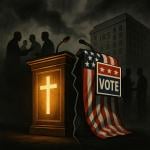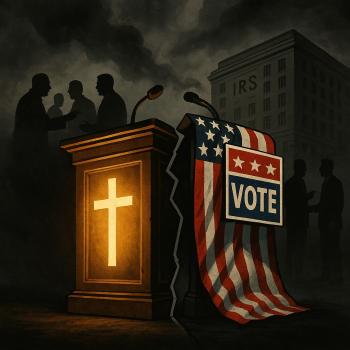
For so many Gen Xers, the music of Ozzy Osbourne was a constant soundtrack growing up in the ’70s, ’80s and into the ’90s. Ozzy often drew the ire of the old folks and establishment, which only made his music more enticing.
But for all his outlandish antics and the fear he instilled in the Parents Music Resource Center, many young people connected with his thoughtful lyrics and weren’t afraid of him at all. Tipper Gore may have warned the world that Ozzy was corrupting America’s youth, but his fans found something else entirely—whether it was the anti-war sentiment in Black Sabbath’s “War Pigs” or the soul-baring lyrics and raw emotional delivery of “Mama, I’m Coming Home.”
Snarky Faith author and podcaster Stuart Delony noted in his article Ozzy vs. Trump: Rock’s Gospel and Political Discord that Ozzy’s lyrics, often dismissed as theatrical or rebellious, actually carry a surprising spiritual weight. In “Crazy Train,” he pleads:
“Maybe it’s not too late /
To learn how to love /
And forget how to hate.”
And then there’s “After Forever,” where Ozzy asks, “Have you ever thought about your soul – can it be saved?” That’s not just a lyric—it’s a theological gut punch.
The suspicion that Ozzy might just be a lovable old teddy bear came into full light when he and his family gave the world an intimate look into their home life in MTV’s early 2000s reality show The Osbournes. It brought a whole new fan base to the Osbourne clan.
In a 2023 encounter with evangelist Dylan Novak, Ozzy Osbourne received a personalized Bible and letter that deeply moved him. As reported by DeWayne Hamby in his Reel Faith column, Osbourne was touched to see his name on the Bible’s cover and insisted on keeping it close during his travels. His son, Jack, later confirmed that the gift had a lasting impact—Ozzy kept the Bible on his bedside table and proudly shared it with visitors.
Hamby’s piece highlights how this quiet moment of faith contrasted with Osbourne’s public persona and sparked family conversations about the Gospel.
Ozzy died the way most wouldn’t expect: quietly, surrounded by love, and still holding to the God he claimed had always been with him.
For a man once crowned the “Prince of Darkness,” whose onstage antics spun him into legend and whose addictions nearly killed him more than once, Ozzy’s legacy is a cocktail of contradiction—equal parts chaos and clarity. He helped birth heavy metal, terrified parents, bit a bat, and outlived the expectations of nearly everyone, including, maybe, himself.
Ozzy said he always believed in God, and toward the end, that faith became more than just an aside. It wasn’t clean or perfect—nothing about him ever was—but it was real. He leaves behind the music, the madness, the family who loved him, and a faith that somehow survived it all.
There are a lot of Gen Xers on social media sharing how hard this news is hitting them.
We knew Ozzy was sick, but like Keith or Willie, we just thought he would always live on.
The greatest thing about music is that he actually will.
Ozzy’s legacy isn’t just the riffs or the headlines—it’s the fact that he kept showing up and kept trying. In music. In family. In grace.
And maybe that’s the most metal thing of all.











